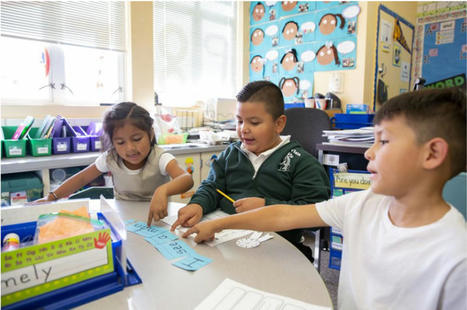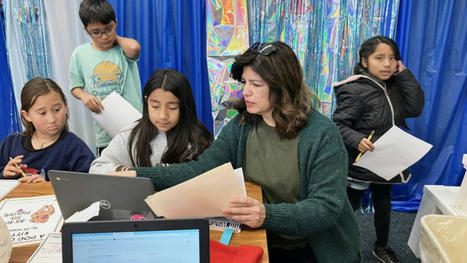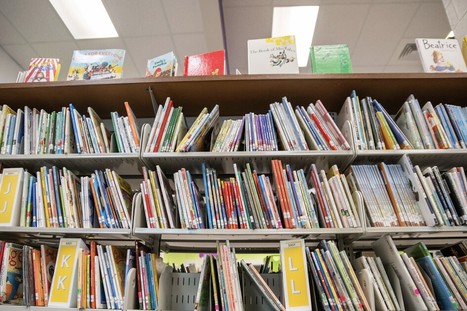 Your new post is loading...

|
Scooped by
Dual Language Education of New Mexico
February 27, 2024 8:35 PM
|
US Senator Brian Schatz (D-Hawai‘i) and US Representative Julia Brownley (D-California) introduced the Biliteracy Education Seal and Teaching (BEST) Act, legislation that would provide federal grants to states to create Seal of Biliteracy programs that encourage and recognize high school students who achieve proficiency in at least two languages. The Senate bill is co-sponsored by US Senators Alex Padilla (D-California), Catherine Cortez Masto (D-Nevada), Jeanne Shaheen (D-New Hampshire), Elizabeth Warren (D-Massachusetts), Ron Wyden (D-Oregon), and Martin Heinrich (D-New Mexico). “In today’s interconnected world, learning a second language not only helps students perform better in school but also improves problem-solving skills

|
Scooped by
Dual Language Education of New Mexico
February 27, 2024 8:28 PM
|
There couldn’t be a better time for the new book Breaking Down the Monolingual Wall: Essential Shifts for Dual Language Success (Corwin Press) to be published and shared through a special series of articles in Language Magazine. This timely publication, authored by eight dynamic and relevant practitioner authors and edited by Dr. Ivannia Soto, highlights the why and the how of multilingual and dual language education as an imperative for true student success. The series will propel and guide us in continuing to move forward toward building stronger and more sustainable multilingual and dual language learning programs. You will find

|
Scooped by
Dual Language Education of New Mexico
January 23, 2024 11:59 AM
|
Concerns have been raised that methodologies based on the Science of Reading may negatively impact English Learners (ELs). On February 8, New America and SEAL will co-host a webinar that will unpack the relationship between the Science of Reading and ELs, including the misconceptions about this much debated topic, best practices for EL-identified students, and implications for dual language programs. The first panel of experts will discuss the policy implications of the Science of Reading for ELs, and the second panel will feature state, district and instructional leaders at the forefront of Science of Reading implementation. Panel 1: Research and
The introduction of AVID Emerge is yet another way that AVID Center is working to transform US public education. This resource aims to support educators with empowering multilingual students—anticipated to make up 25% of the student population in US public schools by next year— with accelerated language acquisition, success in courses of rigor, and the skills necessary for defining their own future.SAN DIEGO, CA, Jan. 18, 2024 (GLOBE NEWSWIRE) -- AVID (Advancement Via Individual Determination),

|
Scooped by
Dual Language Education of New Mexico
January 13, 2024 11:43 AM
|
Secondary education professors authored an award-winning book about the importance of reimagining classrooms and schools as places where newcomer students’ identities are encouraged, nourished and sustained to bolster academic success.
FOR IMMEDIATE RELEASE Contact: Mattie Goldman, [email protected] Multilingual Learner Education Policies Must Advance Equity, Protect Civil Rights WASHINGTON — To advance equity and civil rights, The Leadership Conference on Civil and Human Rights, along with 43 civil rights and education...
A quick guide for caretakers of English learners.

|
Scooped by
Dual Language Education of New Mexico
October 17, 2023 12:37 PM
|
Study shows importance of working memory in helping English learners learn writing.
The Department of Education is proposing new priorities, requirements, and definitions in the National Professional Development (NPD) program that would grow our numbers of bilingual and multilingual educators to expand availability of bilingual programs for all students and help ensure that English Learners have access to well-prepared educators, and emphasize and elevate supports for students from low-income backgrounds. OELA is asking for comments regarding the proposed priorities, requirements, and definitions. To ensure that your comments have maximum effect in developing the final priorities, requirements, and definitions, we urge you to identify clearly the specific proposed priorities, requirements, and definitions that

|
Scooped by
Dual Language Education of New Mexico
September 22, 2023 1:08 PM
|
Words are combined into phrases and sentences in a dazzling array of patterns, collectively referred to as syntax. The complexity of syntax has long confounded researchers. Consider, for example, t…
Many ELL teachers say lacking communication with mainstream teachers can be one of the most significant challenges they face in school.
Speaking up while learning English can be terrifying, writes Newark Student Voices Fellow Karen Otavalo.
In the US, “heritage speakers” are students who were raised in homes where a non-English language was spoken and as a result developed some degree of proficiency in that language. Some of these bilingual students can understand only basic conversations in their heritage languages, others can speak about a variety of topics, and still others are able to write in them. The US is home to heritage speakers of many languages, including Spanish, Arabic, Chinese, Farsi, French, Hindi, Korean, and Russian. There is a large and growing body of research that argues for the following four central tenets regarding heritage
|

|
Scooped by
Dual Language Education of New Mexico
February 27, 2024 8:35 PM
|
As the number of multilingual learners continues to rise in the US, many schools are turning to bilingual education as a means of instruction. A survey by the American Councils Research Center (ARC, 2021) identified over 3,600 dual language bilingual education (DLBE) programs across 44 states.1 The same survey found that over 80% of DLBE programs feature Spanish as a partner language to English, with Chinese and French making up an additional 14% of programs. Increasing the number of DLBE programs is a priority for the US Department of Education (ED). In a recent letter, Secretary Miguel Cardona reiterated the
Supporters of the bill said Native students have been historically excluded from their own education and funding for their schools, condemning previous inaction by the state and educational institutions.
Members of the Congressional Asian Pacific American Caucus commemorate the 50th anniversary of the Lau v. Nichols case, a milestone for bilingual education and language access services.
A coordinator for an English-learner program discusses how to integrate language supports into English/language arts classes.

|
Scooped by
Dual Language Education of New Mexico
January 11, 2024 11:44 AM
|
Why the ACLU supports the right of Deaf and Hard of Hearing children to access language.
TESOL Quarterly (TQ) is one of the most respected publications in second and foreign language teaching, with an annual acceptance rate of 8% of all articl
Grouping English learners together in classrooms, a longstanding practice in schools, has no impact—positive or negative—on reading development for elementary school students, shows a new study by a team of literacy education researchers.
In a new study published in the academic journal Science Advances, linguistic researchers explore the relationship between bilingualism and the brain’s memory functions. The peer-reviewed study by researchers from the Department of Communication Sciences and Disorders at Northwestern University, specifically sought to explore recollection and identification processes in bilingual individuals, compared to monolingual counterparts. Previous research in this area has shown that homophones (words with similar pronunciation but different meanings) can directly impact the brain’s ability to remember and store words. Words with a greater amount of homophones generally have a slower recollection time, and in this case the researchers

|
Scooped by
Dual Language Education of New Mexico
September 24, 2023 3:52 PM
|
Internationalisation increases student diversity. That needs to be reflected in a greater respect for the different languages international student
This paper looks at the next 25 years of education and policy making regarding students classified as English learners (EL). Given the strong research evidence on the benefits of bilingual education and need to address barriers to opportunity experienced by English learners, this paper strengthens the case for federal, state and local education policy and action that looks toward the implementation of bilingual education as the standard service--rather than exception--for EL-classified students.
Numerous studies highlight vocabulary as a critical predictor determining word and text reading comprehension in monolingual and bilingual children, but when measuring vocabulary, most studies focus on either breadth or depth, or conflate the two, which devalues the unique role each dimension plays in reading comprehension.
The poll released by UnidosUS and the National Parents Union says Latino parents want education, among other issues, to be the focus of American politics.
|




 Your new post is loading...
Your new post is loading...



























